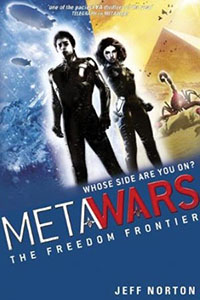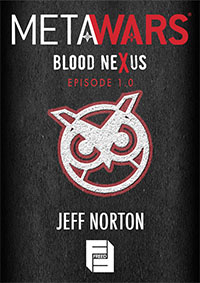
We've been big fans of Jeff Norton's MetaWars since book one, and while it seems to have come around way too quickly, the last book in the 4-book series, MetaWars: 4 - The Freedom Frontier, came out recently and we can heartily recommend it as the blockbuster final instalment in this fast-paced, high-tech, action adventure.
SCI-FI-LONDON were lucky enough to catch up with Jeff to talk about coming to the end of this epic adventure, what the reaction has been, and what his next project will be.
SFL: Hi Jeff, good to see you again and thanks for talking to SCI-FI-LONDON.
JN: No problem guys, it's always a pleasure.
SFL: MetaWars: 4 - The Freedom Frontier starts with an even bigger bang than the other books, and the action is pretty relentless from start to end, was that entirely deliberate in that you were conscious of having that grand finale or did you just have loads to cram in there?
JN: I wanted to upend the reader’s expectations with this book. In The Freedom Frontier, I put the ‘big battle’ right at the get-go, turning the tables on the characters…and the reader. With MetaWars, my creative goal is to keep the reader guessing. Playing with expectations is one way to do that.
SFL: The story takes a pretty wild change of direction with Jonah and Sam teaming up with Granger to stop the war once and for all, was that in your mind from the outset of the series? If not, at what point did it come to you.
JN: I’ve always thought that the story of the future would be written by the intersection and interaction of these three people. The series is about their choices, and their growth as people; both as friends and enemies.
In MetaWars, I challenge the notion of good vs. evil, as nothing is black and white. The idea of Jonah and Sam’s bitter enemy, Matthew Granger, eventually becoming their ally was in my head from the beginning. Jonah, (and eventually, Sam) represents the power of optimism over cynicism and he eventually wins over his fiercest enemy. For that to work, the core drama in the finale would have to come down to the three of them.
SFL: There are a couple of things that happen in earlier books that seemed less significant but get paid off in this book, so are you a big outliner, working everything out methodically before you write? How long did it take you to work out the story over 4 books?
JN: I like to know where I’m going, but I do leave room to explore the journey. I mapped out the rough story of each book a long time ago. I always knew the ending, and the creative process was to find the most exciting path to get there.
SFL: Jonah and Sam have had to do a lot of growing up through these books, not just physically, but in the choices they make and their moral judgments. Was that always on your mind as part of the planning for the series, and how much did they surprise you as you wrote the story?
JN: These books have always been about choice. The characters define themselves by their actions; by the choices they make – and for Jonah, a journey to refine his moral compass. For Sam, her character arc has been very different - she’s pulled back from the brink of being almost non-human. She discovers she has a moral code.
I was pretty clear with who they are as people, but along the way, the characters took over the story. As they grew up, they did things that surprised me. I never expected to write in any kissing into these books! But Jonah and Sam are maturing teenagers – in tight quarters, taunting death most of the time – so they found their own way into a physical relationship.
As for Granger, I’ve always seen him as a sympathetic character - and like all great "villains", he’s trying to do what he thinks is right to make a better world. He admires Jonah, who is really the parallel universe version of a teenage Granger. In a way, Granger sees Jonah as the path not taken. Part of him wants to protect and nurture that alternative reality which is at odds with Jonah’s role as an obstruction to Granger's goals.
SFL: The books are predominantly pitched at a YA audience but you ask a lot of your readers - the complexity of the story, the moral choices, the fact that there are no easy answers; was that always part of the thinking with MetaWars, to push young readers to think more?

JN: I was a very reluctant reader as an adolescent – I was way more into science fiction films and video games, so I originally created MetaWars to be the book that would be as addictive and as compelling to a teenage version of myself (today) as those media.
But I never really think of MetaWars as being just for YA (young adult) readers - I like to think they are for anyone aged 9 to 90! But different readers get different experiences from the books. Younger readers take away a relentless action-thrill ride, whereas more seasoned readers see the books as an exploration on morality in the digital age. And they’re both right!
SFL: We've spoken before about the economics of the MetaWars world, and about how a lot of what goes on revolves around commerce. Do your readers get that? Do they understand the impact it has on everyone, and do you think they learn lesson from it.
JN: I don’t think most people understand the impact our free-market economy has on our lives; so I did want to shine a light on the market failures that exist in our system. The fist MetaWars novel is a post-financial-crisis book, and it explores what I think will be the cause of next major financial meltdowns: peak-resource (water, oil, food), tax avoidance, and energy security.
You asked earlier about writing for young adults; I suppose part of me is actually writing for young people that are going to be voters in just a few years. And I am hoping that MetaWars will expand their outlook and sharpen their critical thinking skills.
SFL: Was there anything that changed significantly between your planning, plotting and outlining, and the final books? Would you share what it was and why it changed.
JN: Probably the biggest change was the (virtual) reappearance of Jonah’s father in book 4. If you remember (spoiler alert!) I tie off his character arc quite neatly at the end of book 3 in a very emotional experience for Jonah. I’d been wrestling for a long time about whether Jonah should face his father again, but wanted to do it in an honest, organic way. I won’t give away the mechanic, but I hope you agree that it works.
The other dynamic that grew out of the writing process, that I didn’t expect, was to see Jonah’s mother again. By making her a meta-phobe, I’d essentially written out the chance to see her again, but in building the backstory for book 4, I realized that there was a very natural way for Jonah to see her one last time. For Jonah, seeing both his parents again in The Freedom Frontier, gives him real closure; it’s what allows him to move on with his life and his cause.
SFL: Nobody in the books is entirely black or white, good or bad. Given your main audience, was it important to you to show those shades of grey, that there are two sides to any argument?
JN: Life is lived in the shades of grey and it really frustrates me that a lot of YA fiction paints characters as all good or all bad. People are very complex and characters should be complex too. It was a very deliberate choice, and something that a lot of fans tell me marks the MetaWars out from other YA fiction series, that the characters feel real: morally clouded and often confused. I remember being a teenager very clearly and nothing was straightforward; everything was confusing. I’ve tried to capture that perspective in the books.
SFL: Throughout the 4 books you haven't been afraid to kill characters off, so it feels like no-one is safe. How have the readers reacted to characters dying and do you ever have second thoughts about it?
JN: I’m ruthless because I’m a servant to the story. I want to keep the reader guessing. My goal keep readers up past their bedtimes, reading late into the night because they just have to find out how it ends. One way to keep the reader hooked is to constantly threaten the characters they care about with imminent death.
SFL: Clearly the impact of technology on us, in our daily lives, on our culture, on how we behave has been a big influence on the MetaWars series, but do you think the future really looks that bleak or is there good news in their somewhere, even if it doesn't sell as many books?
JN: On the most macro level, MetaWars is a metaphor for what we’re all doing on planet Earth in the early part of the twenty-first century: we are burying ourselves in social media and concerning ourselves with frivolous distractions (what Noam Chomsky called ‘Necessary Illusions’) when the sustainability of our species is being risked by man-made factors, specifically climate change and population growth.
Now, I’m an optimist by nature, but I’m pretty worried.
Jonah’s journey in the MetaWars books reflects the global awakening that I think is starting to happen, but needs to accelerate - to recognize that to survive (and thrive) we need to live differently. In the final book, Jonah nailed it by calling it: Live For Real. For me, that means living within our means - economically and ecologically.
I refuse to be pessimistic because I think we’re capable of rising to the challenge, but I am concerned that enough people aren’t interested in taking on the challenge because it will mean a serious disruption to the status quo…and today, that status quo works pretty well for a lot of (powerful) people. But if we’re going to thrive as a species, we need to follow Jonah’s lead.

SFL: You must have had mixed feelings about coming to the end of the series, are you sad about it or are you just looking forward to new challenges?
JN: Writing "the end" was incredibly emotional. I’ve lived with these characters for years now; they are a part of me. But I was very happy with the way I left Jonah and Sam - to me, it’s an elegant ending.
So there won’t be any more sequels to MetaWars, but I didn’t have to fully say goodbye. I was approached by a tech start-up called Freed Fiction (www.freedfiction.com) to create an interactive prequel trilogy, so I’ve happily delved back into the MetaWars mythology. The series is called MetaWars: Blood Nexus and the first 'episode' has just launched as a free ebook on the iOS ibookstore (Check it out at: http://bit.ly/1hUEcge).
Since MetaWars is all about choice, Blood Nexus lets the reader choose what the characters do. It’s inspired by the book series 'Choose Your Own Adventure' (though readers in the UK will be more familiar with 'Fighting Fantasy') that helped to turn me into a reader.

SFL: So what's next for Jeff Norton?
JN: I’m really excited to move from action to comedy. This summer, my new book publishes: 'Memoirs of a Neurotic Zombie'. It’s about a twelve-year-old boy with OCD called Adam Meltzer (http://www.facebook.com/AdamMeltzerZombie) who rises from the grave to solve his own murder. It’s a very funny middle-grade book that celebrates how awkward and sometimes gross it is to be an adolescent. I actually wrote it in my childhood hometown in Canada, including my middle school. It publishes 7th August from Faber & Faber (http://amzn.to/176XI3p).
It’s actually inspired by the comic tone of a short film I made about an adult zombie trying to get his life back on track: https://vimeo.com/32102311.
SFL: Wow! Thats sounds like tons-of-fun, we can't wait, and the Blood Nexus interactive books are going to be great. Good luck with everything and thanks once again for talking to SCI-FI-LONDON.
JN: Once again, no problem, and thanks to you too.
Lot's of interesting stuff there right? For those of you who want to grab copies you can get them with fee worldwide delivery at The Book Depository. If you want to know more about Jeff Norton, he's on the web at www.jeffnorton.com and tweeting as @thejeffnorton.